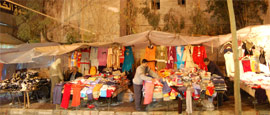Damascus History
Damascus has a bloody history that sadly mirrors its recent circumstances. Founded in the shadow of Mount Qassioun, the original settlement was born around 4000BC.
Early rulers included the fearsome Hyksos, who wreaked havoc on Ancient Egypt around 1350BC, and the Hittites. The latter repeated the trick, only ending their persistent invasions when Ramesses II agreed to a treaty which involved giving up all claims to the Damascus area.
Next came the Aramaeans, who founded several small kingdoms in the area, but like their brethren in neighbouring Judea, they found themselves conquered by the Assyrians, then Alexander the Great and his Macedonians, and finally Rome.
Part of the Byzantine Empire after Rome’s demise, the city was taken by Arab-Muslim general Khalid ibn al-Walid in 635 for the Ummayads. They ruled until 750 when the Abbasids took power. The Tulunids, Qarmatians, Fatmids and the Seljuq Turks all took control of the city shortly afterwards.
Although initially content to fight amongst themselves, the Seljuq Turks were forced back into battle in the 11th century, when the Crusaders arrived. Despite some successes, the Seljuqs were finally overwhelmed when Mongol hordes attacked from the East in 1260.
The removal of the Seljuqs ushered in a rare period of peace under the Mamluk rulers of Egypt. They governed until Timur led a second Mongol invasion in 1400. He sacked the city and beheaded anyone who got in his way.
The city had hardly recovered when Damascus fell to the Ottomans in 1516. It remained part of their empire until 1918. Liberated by a combination of the Arab Revolt and advancing British forces, the city then became part of a French mandate in 1920 under the Sykes-Picot agreement.
In WWII, the city came under Nazi control briefly before it was liberated by British forces for a second time in June 1941. In 1946, the French agreed to Syrian independence, leaving the city to become capital of modern Syria. In 2011, the city became the epicentre of the Syrian Civil War which engulfed the entire country.
Did you know?
•Legend has it that the Great Mosque of Damascus houses the head of St John the Baptist.
• Damascus was first mentioned in Egyptian geographical lists in the 15th century.
• The beautiful silk-like fabric Damask and the strongly-scented Damask rose both originated in Damascus.
Do you have any Feedback about this page?
© 2026 Columbus Travel Media Ltd. All rights reserved. No part of this site may be reproduced without our written permission, click here for information on Columbus Content Solutions.




 You know where
You know where